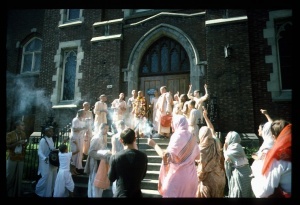SB 11.7.19: Difference between revisions
No edit summary |
(Vanibot #0054 edit - transform synonyms into clickable links, which search similar occurrences) |
||
| Line 24: | Line 24: | ||
<div class="synonyms"> | <div class="synonyms"> | ||
śrī-bhagavān | ''[//vanipedia.org/wiki/Special:VaniSearch?s=śrī&tab=syno_o&ds=1 śrī]-[//vanipedia.org/wiki/Special:VaniSearch?s=bhagavān&tab=syno_o&ds=1 bhagavān] [//vanipedia.org/wiki/Special:VaniSearch?s=uvāca&tab=syno_o&ds=1 uvāca]'' — Lord Kṛṣṇa said; ''[//vanipedia.org/wiki/Special:VaniSearch?s=prāyeṇa&tab=syno_o&ds=1 prāyeṇa]'' — in general; ''[//vanipedia.org/wiki/Special:VaniSearch?s=manujāḥ&tab=syno_o&ds=1 manujāḥ]'' — humans; ''[//vanipedia.org/wiki/Special:VaniSearch?s=loke&tab=syno_o&ds=1 loke]'' — in this world; ''[//vanipedia.org/wiki/Special:VaniSearch?s=loka&tab=syno_o&ds=1 loka]-[//vanipedia.org/wiki/Special:VaniSearch?s=tattva&tab=syno_o&ds=1 tattva]'' — the factual situation of the material world; ''[//vanipedia.org/wiki/Special:VaniSearch?s=vicakṣaṇāḥ&tab=syno_o&ds=1 vicakṣaṇāḥ]'' — who know expertly; ''[//vanipedia.org/wiki/Special:VaniSearch?s=samuddharanti&tab=syno_o&ds=1 samuddharanti]'' — they deliver; ''[//vanipedia.org/wiki/Special:VaniSearch?s=hi&tab=syno_o&ds=1 hi]'' — indeed; ''[//vanipedia.org/wiki/Special:VaniSearch?s=ātmānam&tab=syno_o&ds=1 ātmānam]'' — themselves; ''[//vanipedia.org/wiki/Special:VaniSearch?s=ātmanā&tab=syno_o&ds=1 ātmanā]'' — by their own intelligence; ''[//vanipedia.org/wiki/Special:VaniSearch?s=eva&tab=syno_o&ds=1 eva]'' — indeed; ''[//vanipedia.org/wiki/Special:VaniSearch?s=aśubha&tab=syno_o&ds=1 aśubha]-[//vanipedia.org/wiki/Special:VaniSearch?s=āśayāt&tab=syno_o&ds=1 āśayāt]'' — from the inauspicious attitude of desiring sense gratification. | ||
</div> | </div> | ||
Latest revision as of 20:51, 17 February 2024

A.C. Bhaktivedanta Swami Prabhupada
Please note: The synonyms, translation and purport of this verse were composed by disciples of Śrīla Prabhupāda
TEXT 19
- śrī-bhagavān uvāca
- prāyeṇa manujā loke
- loka-tattva-vicakṣaṇāḥ
- samuddharanti hy ātmānam
- ātmanaivāśubhāśayāt
SYNONYMS
śrī-bhagavān uvāca — Lord Kṛṣṇa said; prāyeṇa — in general; manujāḥ — humans; loke — in this world; loka-tattva — the factual situation of the material world; vicakṣaṇāḥ — who know expertly; samuddharanti — they deliver; hi — indeed; ātmānam — themselves; ātmanā — by their own intelligence; eva — indeed; aśubha-āśayāt — from the inauspicious attitude of desiring sense gratification.
Translation and purport composed by disciples of Śrīla Prabhupāda
TRANSLATION
The Supreme Lord replied: Generally those human beings who can expertly analyze the actual situation of the material world are able to raise themselves beyond the inauspicious life of gross material gratification.
PURPORT
Śrī Uddhava expressed to the Lord in the previous verses his fallen condition and his entanglement in the material concept of life. Now Lord Kṛṣṇa reassures Uddhava that even persons far less qualified than Uddhava are able to extricate themselves from the inauspicious life of material sense gratification. According to Śrīla Śrīdhara Svāmī, even if one has not received the instruction of a bona fide spiritual master, one can understand by direct and indirect analysis that the material world is not a place of enjoyment. Direct analysis means one's personal experience and indirect analysis means hearing and reading of the experience of others.
According to Śrīla Viśvanātha Cakravartī Ṭhākura, Lord Kṛṣṇa considered Uddhava to be more intelligent than even the demigods in heaven. Uddhava, however, was feeling discouraged, thinking himself unqualified to render devotional service to the Lord. But Uddhava was actually perfectly situated because he had achieved Lord Kṛṣṇa as his personal spiritual master. Similarly, the members of the Kṛṣṇa consciousness movement are guided by the instructions of the Society's founder-ācārya, Oṁ Viṣṇupāda Paramahaṁsa Parivrājakācārya Aṣṭottara-śata Śrī Śrīmad A.C. Bhaktivedanta Swami Prabhupāda. Therefore, a sincere member of the Kṛṣṇa consciousness movement should never feel discouraged but should rather count his blessings and do the needful to go back home, back to Godhead. Within the material world, certain activities are auspicious and produce happiness, whereas other activities, being sinful, are inauspicious and cause unlimited suffering. Even one who has not yet received the complete mercy of the bona fide Kṛṣṇa conscious spiritual master should conclude by sharp intelligence that there is no happiness in ordinary, material life and that real self-interest lies beyond the material platform.
Śrīla Madhvācārya points out that even if one is expert not only in material knowledge but also in spiritual knowledge, one will enter into the darkness of ignorance if one neglects the association of the devotees of the Lord. Therefore, one should not misinterpret this verse in a way that minimizes the significance of the pure devotee spiritual master. One who is vicakṣaṇāḥ, or expert, will eventually come to understand the difference between matter and spirit. Such a person will certainly recognize and appreciate a genuine spiritual master. One who is advanced in knowledge undoubtedly becomes humble, and thus an expert advanced human will never neglect the lotus feet of the pure devotees of the Lord.